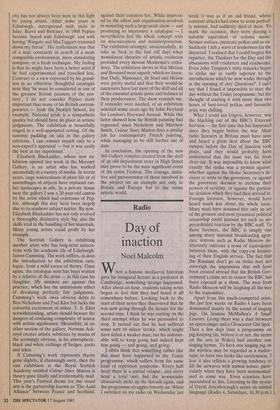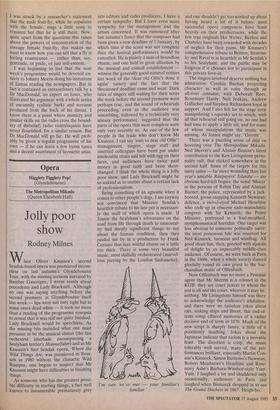Radio
Day of
inaction
Noel Malcolm
When a famous mediaeval historian gave his inaugural lecture as a professor at Cambridge, something strange happened. After about an hour, students taking notes began to feel that they had heard it all somewhere before. Looking back to the start of their notes they discovered that he was now going through the lecture for the second time. I think he was starting on the third attempt when he was persuaded to stop. It turned out that he had suffered some sort of minor stroke, which might have felled a weaker man; but his indomit- able will to keep going had indeed kept him going — and going, and going.
I often think that something rather like this must have happened to the Today programme, which suffers from the same kind of repetition syndrome. Every half hour there is a partial relapse, and every hour a total one; but the newsreader obsessively picks up the threads again, and the programme struggles bravely on. When I switched on my radio on Wednesday last week it was as if an old friend, whose constant attacks had come to seem perfect- ly normal, had suddenly died of them. To mark the occasion, they were playing a suitable equivalent of solemn music: Strauss waltzes, pizzicato polkas and so on. Suddenly I felt a wave of tenderness for the departed. I realised that I could forgive the repartee, the Thinkers for the Day and the obsessions with cricketers and roadworks. Even John Timpson's witty remarks began to strike me as vastly superior to the introductions which he now wades through at the opening of Any Questions?. I can't say that I found it impossible to start the day without the Today programme; but the thought of starting it with more than two hours of best-loved polkas and favourite arias was chilling.
What I could not forgive, however, was the blacking out of the BBC's External Services — the first time this has happened since they began before the war. Most radio listeners in Britain must have seen and heard a great deal about the BBC rumpus before the Day of Inaction took place, and they would probably have understood that the issue was far from clear-cut. It was impossible to know what exactly the strike was a protest against: whether against the Home Secretary's de- cision to write to the governors, or against the governors' decision to exercise their powers of scrutiny, or against the particu- lar decision which they had then arrived at. Foreign listeners, however, would have heard much less about the whole issue. Many must have assumed that only an act of the grossest and most tyrannical political censorship could account for such an un- precedented reaction by the BBC staff. To these listeners, the BBC is simply one among many national broadcasting agen- cies; stations such as Radio Moscow de- liberately cultivate a sense of equivalence between them, with the copy-cat format- ing of their English service. The fact that the Russians don't go on strike may not outweigh the impression that will have been created abroad that the British Gov- ernment's claim not to censor the BBC has been exposed as a sham. The men from Radio Moscow will be laughing all the way to the transmitter.
Apart from this much-trumpeted crisis, the last few weeks on Radio 4 have been dominated mainly by the sound of singing pigs. On Jeanine McMullen's A Small Country Living there was a duet between an opera singer and a Gloucester Old Spot. Then a few days later a programme on pig-keeping (in, believe it or not, the series on the arts in Wales) had another one singing hymns. To have one singing pig on the wireless may be regarded as a misfor- tune; to have two looks like carelessness. I fear it also reflects a growing tendency to fill the airwaves with animal noises, parti- cularly when they have been sentimental- ised in some way. Even scientists have succumbed to this. Listening to the re-run of David Attenborough's series on animal language (Radio 4, Saturdays, 10.30 p.m.)
I was struck by a researcher's statement that the male fruit-fly, while he copulates with the female, sings a little song to reassure her that he is still there. Now, quite apart from the questions this raises about the powers of concentration of the average female fruit-fly, this makes me want to know how you can tell that a fly is feeling reassurance — rather than, say, gratitude, or pride, or just self-esteem.
I was beginning to feel that the next week's programme would be devoted en- tirely to Johnny Morris doing his imitations of llamas reading the newspapers. But in fact it contained an extraordinary talk by a Dr MacDonald, an expert on foxes, who illustrated his argument with a whole series of uncannily realistic barks and screams produced from the back of his throat. I know there is a point where mimicry and similar skills on the radio cross the bound- ary of disbelief; radio ventriloquists have never flourished, for a similar reason. But Dr MacDonald will go far. He will prob- ably be given a regular programme of his own — if he can learn a few hymn tunes and a decent assortment of favourite arias.















































 Previous page
Previous page